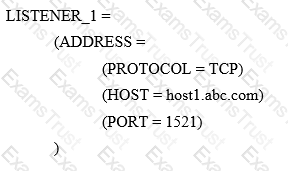Which is the default column or columns for sorting output from compound queries using SET operators such as intersect In a SQL statement?
You want to apply the principle of Least Privilege in all your live databases.
One of your requirements is to revoke unnecessary privileges from all users who have them using Privilege Analysis.
Which three types of analyses can be done using the DBMS_PRIVILEGE_CAPTURE package? (Choose three.)
Which two statements are true about Oracle synonyms?
Which three files are used by conventional path SQL*Loader when the TABLE option is not specified? (Choose three.)
Which two statements are true about trace files produced by the Oracle Database server? (Choose two.)
Your database instance is started with an SPFILE.
A PFILE is also available. You execute this command:
ALTER SYSTEM SET DB_CACHE_SIZE=100K;
Where Is the value changed?
A script abc.sql must be executed to perform a job.
A database user HR, who is defined in this database, executes this command:
$ sqlplus hr/hr@orcl @abc.sql
What will happen upon execution?
Which statement is true about aggregate functions?
Your database instance is started with a PFILE.
Examine these parameters:

You want to increase the size of the buffer cache.
Free memory is available to increase the size of the buffer cache.
You execute the command:
SQL> ALTER SYSTEM SET DB_CACHE_SIZE=1024M;
What is the outcome?
Which two statements are true about space-saving features in an Oracle Database? (Choose two.)
Which three are types of segments in an Oracle Database? (Choose three.)
Which three statements are true about time zones, date data types, and timestamp data types in an Oracle database? (Choose three.)
Which statement is true about the INTERSECT operator used in compound queries?
Which three Oracle database space management features will work with both Dictionary and Locally managed tablespaces? (Choose three.)
Which three statements are true about table data storage in an Oracle Database? (Choose three.)
Which three statements are true about the Oracle Data Dictionary? (Choose three.)
Examine the description of the SALES1 table:

SALES2 is a table with the same description as SALES1.
Some sales data is duplicated in both tables.
You want to display the rows from the SALES1 table which are not present in the SALES2 table.
Which set operator generates the required output?
Which three statements are true about single-row functions? (Choose three.)
The CUSTOMERS table has a CUST_CREDIT_LIMIT column of data type NUMBER.
Which two queries execute successfully? (Choose two.)
In the spfile of a single instance database, LOCAL_LISTENER is set to LISTENER_1.
The TNSNAMES.ORA file in $ORACLE_HOME/network/admin in the database home contains:

Which statement is true?
You want to write a query that prompts for two column names and the WHERE condition each time it is executed in a session but only prompts for the table name the first time it is executed.
The variables used in your query are never undefined in your session.
Which query can be used?